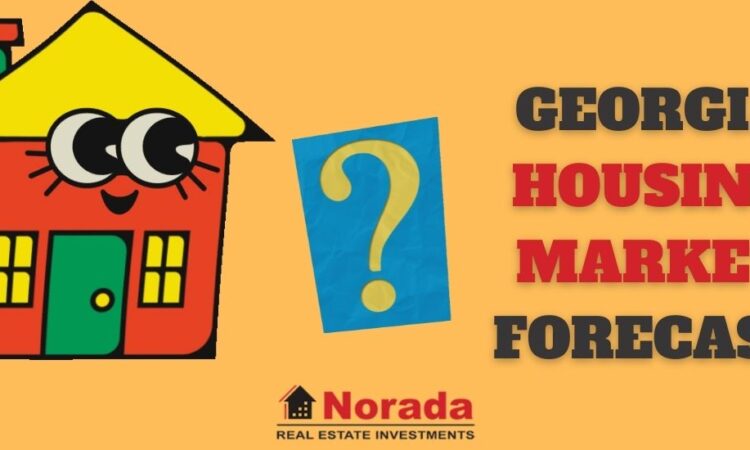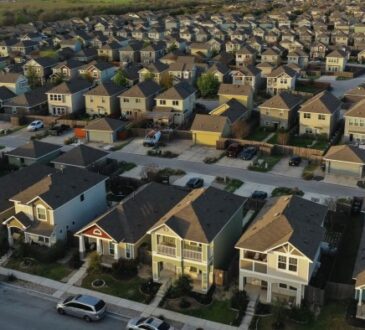
The Georgia housing market continues to be robust by a combination of high demand, limited supply, and steadily increasing house selling prices. A study finds that Georgia has the most overpriced housing market in America. According to data from Florida Atlantic University, Georgia has the most overpriced housing market in the United States, with Atlanta topping the list.
Atlanta, Georgia’s capital city, beats out multiple Florida cities, Charlotte, North Carolina, and Memphis, Tennessee, to take the top spot for 2023. The researchers used their own methodology combined with open-source data from Zillow and other providers. The data shows that homes in Atlanta are selling for more than 51% more than what they’re worth, leading to a big difference between how much people are paying and how much the home is actually valued.
Read About: Atlanta Housing Market Trends
The study found that the average listing price in Atlanta was $357,677, but the expected home value was only $236,627. This means that if you’re looking to buy a home in Atlanta, you could be paying over $100,000 more than the actual value of the property. There are several reasons why Atlanta’s housing market is so overpriced.
One of the main reasons is the strong job market and the city’s booming tech center. Atlanta is home to several large technology companies, including Google, Microsoft, and IBM. This has led to a large influx of people moving to the city for work, which has caused housing prices to skyrocket. Another reason why Atlanta’s housing market is so overpriced is that the city is a popular destination for retirees and second-home buyers. Many people choose to move to Atlanta for its mild climate, low cost of living, and easy access to recreational activities.
Georgia Housing Prices And Forecast for 2024-2025
Here’s an overview of the current market conditions and a look into the top 10 Metropolitan Statistical Areas (MSAs) in Georgia with the most substantial home price growth predictions.
1. Average Home Value
According to Zillow, the average home value in Georgia stands at $317,982, reflecting a notable 3.6% increase over the past year. This growth indicates a positive trend in the state’s real estate market.
2. Days on Market
Properties in Georgia are going pending in approximately 30 days, showcasing the demand for homes in the region. This statistic is indicative of a swift and active housing market, with buyers quick to secure their desired properties.
3. For Sale Inventory
As of January 31, 2024, there are 34,340 homes available for sale in Georgia. This inventory level plays a crucial role in shaping the overall market dynamics, influencing factors such as pricing and competition.
4. New Listings
In the same period, 8,663 new listings have been added to the market, contributing to the overall housing supply. New listings are essential for meeting the demand and ensuring a balanced market.
5. Median Sale to List Ratio
The median sale to list ratio as of December 31, 2023, is 0.992. This ratio provides an understanding of how close homes are selling to their listed prices, offering insights into negotiation trends within the market.
6. Median Sale Price
As of December 31, 2023, the median sale price in Georgia is $303,833. This figure represents the middle point of all home sale prices, giving a snapshot of the overall pricing landscape in the state.
7. Median List Price
The median list price as of January 31, 2024, is $347,267. This is the midpoint of all current home listings and serves as a reference point for both buyers and sellers in the market.
8. Percent of Sales Over and Under List Price
Examining the market dynamics, 23.2% of sales in Georgia were over list price as of December 31, 2023, while 53.7% were under list price. These percentages offer insights into the negotiation strategies employed by buyers and sellers in the state.
Is Georgia a Buyer’s or Seller’s Housing Market?
As of the latest data, the market conditions suggest a more balanced scenario. With a steady increase in home values and moderate growth rates in various regions, both buyers and sellers can find opportunities in this market. However, local factors and specificities of certain areas may influence whether it leans more towards a buyer’s or seller’s market.
Are Home Prices Dropping in Georgia?
Contrary to concerns about dropping home prices, the data indicates an overall positive trend in Georgia. While some areas may experience slight fluctuations, the majority show consistent or increasing prices. It’s essential to consider factors such as inventory levels, demand, and economic indicators to gauge the stability of the housing market in specific regions.
Top 10 Areas in Georgia Poised for Home Price Growth by Jan 2025
The following regions in Georgia, as outlined in the data provided, stand out as promising locations for prospective homebuyers and investors:
1. Thomaston, GA
Located in the Thomaston metropolitan statistical area (MSA), this region in Georgia shows promising signs. As of January 31, 2024, Thomaston is expected to experience a slight dip of -0.1% in home prices by February 29, 2024, but it is projected to rebound with a growth of 1.7% by April 30, 2024, and a significant surge of 10.2% by January 31, 2025.
2. Cedartown, GA
Within the Cedartown metropolitan statistical area, the real estate market is looking optimistic. Starting with a modest increase of 0.4% by February 29, 2024, home prices are forecasted to rise further, reaching 2.1% by April 30, 2024, and 8.6% by January 31, 2025.
3. Calhoun, GA
The Calhoun metropolitan statistical area in Georgia is poised for growth. With an initial uptick of 0.7% by February 29, 2024, home prices are anticipated to climb to 2.4% by April 30, 2024, and 8.3% by January 31, 2025.
4. Toccoa, GA
Toccoa, situated in the Toccoa metropolitan statistical area, shows promise in the real estate landscape. Starting with a modest increase of 0.1% by February 29, 2024, the region is projected to experience a growth of 1.2% by April 30, 2024, and 8.1% by January 31, 2025.
5. Cornelia, GA
In the Cornelia metropolitan statistical area, the real estate market is anticipated to see positive changes. Starting with a modest increase of 0.2% by February 29, 2024, home prices are expected to rise to 1.4% by April 30, 2024, and 7.9% by January 31, 2025.
6. Statesboro, GA
Statesboro, part of the Statesboro metropolitan statistical area, is anticipated to witness positive changes in its real estate market. Starting with an increase of 0.6% by February 29, 2024, the region is expected to experience a growth of 2% by April 30, 2024, and 7.3% by January 31, 2025.
7. Savannah, GA
In the Savannah metropolitan statistical area, the real estate market presents opportunities for growth. With an initial increase of 0.5% by February 29, 2024, home prices are projected to rise to 1.8% by April 30, 2024, and 7% by January 31, 2025.
8. Athens, GA
Within the Athens metropolitan statistical area, positive trends are expected. Starting with an increase of 0.5% by February 29, 2024, home prices are forecasted to grow further to 1.7% by April 30, 2024, and 7% by January 31, 2025.
9. Gainesville, GA
The Gainesville metropolitan statistical area in Georgia is poised for growth. With an initial increase of 0.3% by February 29, 2024, home prices are anticipated to climb to 1.6% by April 30, 2024, and 6.9% by January 31, 2025.
10. Jefferson, GA
Jefferson, situated in the Jefferson metropolitan statistical area, shows promise in the real estate landscape. Starting with an increase of 0.5% by February 29, 2024, the region is projected to experience a growth of 1.8% by April 30, 2024, and 6.9% by January 31, 2025.
These regions in Georgia not only offer diverse living environments but also present attractive opportunities for individuals seeking to make strategic investments in a market poised for home price growth.
Factors Influencing the Georgia Housing Market:
Several factors contribute to the state of the housing market in Georgia:
- Mortgage Rates: Fluctuating mortgage rates impact buyers’ purchasing power and can affect demand for homes. Buyers may be hesitant to enter the market if rates continue to rise significantly.
- Inventory Levels: The supply of available homes for sale affects market dynamics. A shortage of inventory can drive up prices, while a surplus can lead to price stagnation or decline.
- Economic Conditions: Georgia’s overall economic health, job market, and business climate can influence the housing market. Economic growth typically drives demand for housing.
Will The Georgia Housing Market Crash?
We continue to hear rumors of a market crash, but local data does not corroborate this at this time. We’re not seeing any major home price decline or crash in the Georgia housing market just yet. There are certain factors that suggest that the market may remain strong. Georgia has a robust and diverse economy with industries such as logistics, film, and technology, which have been growing rapidly in recent years. The state also has a pro-business environment, low taxes, and a relatively low cost of living compared to other states.
Georgia is predicted to remain a top-ranked state and relocation destination. The flood of new inhabitants will increase competition and limit housing availability, making Georgia real estate even tighter. According to YouGov, Georgia is ninth on the list of all US states sorted from best to worst, according to Americans.
YouGov asked people to choose the better of two states in a series of head-to-head matchups. States were rated based on their “win percentage”, that is: how often that state won the head-to-head matchup when it was one of the two states shown. Georgia Two other destinations for warm weather and ocean coastlines landed in ninth and tenth place, respectively: Georgia (58%) and Texas (58%).
Over the past decade, the state has experienced significant population growth, with an increase of over 1 million people from 2010 to 2020, according to the US Census Bureau. This growth has been driven by a combination of factors, including a strong economy, a relatively low cost of living, and a warm climate.
The influx of new residents has put pressure on the housing market, particularly in cities such as Atlanta and Savannah. As more people move to Georgia, the demand for housing increases, which can lead to rising prices and a shortage of affordable housing options. This has made it challenging for some residents to find suitable housing, especially those with lower incomes.
Another factor that affects the housing market in Georgia is demographic change. The state has a growing number of young professionals and retirees, both of whom have different housing needs. Young professionals tend to prefer urban areas with easy access to amenities, while retirees often prefer quieter suburban or rural communities. This has led to a growing demand for both urban and suburban housing in Georgia.
In addition, Georgia’s population growth has also been driven by a diverse range of ethnic and racial groups. This diversity has contributed to the state’s vibrant culture and strong economy, but it also presents unique challenges for the housing market. Different ethnic and racial groups may have different housing preferences, which can affect the availability and affordability of housing in certain areas.
That being said, there are always risks and uncertainties in any housing market. Factors such as changes in interest rates, job losses, and a slowdown in the economy could potentially impact the demand for housing and cause prices to fall.
In conclusion, while there are some positive signs for the Georgia housing market, it is always important to be cautious and keep an eye on market trends. The strong economy and growing population make Georgia an attractive place to live and do business, but the limited housing availability and increased competition could make it challenging for some buyers.
Data Sources:
- https://www.zillow.com/ga/home-values/
- https://www.zillow.com/rental-manager/market-trends/ga/
- https://fred.stlouisfed.org/series/ACTLISCOUGA#
- https://www.rent.com/research/average-rent-price-report/
- https://www.worldbank.org/en/country/georgia/overview
- https://www.adb.org/news/georgia-economy-grow-3-5-2022-adb
- https://www.georgia.org/demographics
- https://www.zillow.com/research/data/
- https://business.fau.edu/executive-education/housing-market-ranking/housing-top-100/
- https://today.yougov.com/topics/travel/articles-reports/2021/04/13/us-states-ranked-best-worst-according-americans




